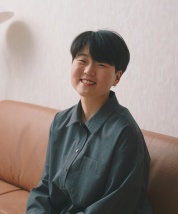Family ID(Working title)
Amidst COVID-19, I lost my mother. While sorting her belongings, I found a note that hints at the secret of my birth.
My mother, who cherished me as her late-in-life daughter, passed away from COVID-19. Among her belongings, I discovered a note hinting at adoption, setting me on a journey to uncover the secrets of my birth. Another identity, another name. Surprising revelation of sisters despite being the only daughter. The harsh reality of being abandoned by biological parents just for being born without balls.
In an instant, the beliefs I held as 'truth' collapsed like dominoes. I split from my long-time boyfriend and faced gender identity confusion. It hit me hard that my dreams of a conventional family were more hers than mine. In all the chaos, I admitted to myself and fully embraced my identity as a queer. With my non-binary partner, I discovered a newfound sense of love, building a family that feels authentically ours.
In this film, I aim to explore the process of seeking my biological parents from a feminist lens and uncover the gendered nature of adoption. Additionally, I intend to shed light on the stories of women unable to bear children or sons and the plight of children abandoned or killed due to being female against the backdrop of a patriarchal society with ironic complexities.
Meanwhile, this film portrays love towards my mother, Haesuk, who gave me my true first name, 'Minji.' Inheriting her greatest legacy, 'love,' I strive to build my own family, just as she did. Creating this film is a process of accepting and mourning her death. Also, I aim to delve into Haesuk's 'love' not as a mother but as a person, contemplating how to carry forward this love in my own life as an adoptee.


(54999) 2F, JEONJU Cine Complex, 22, Jeonjugaeksa 3-gil, Wansan-gu, Jeonju-si, Jeonbuk-do, Republic of Korea
T. +82 (0)63 288 5433 F. +82 (0)63 288 5411
(04031) 4F, 16, Yanghwa-ro 15-gil, Mapo-gu, Seoul, Republic of Korea
T. +82 (0)2 2285 0562 F. +82 (0)2 2285 0560
(54999) JEONJU Cine Complex, 22, Jeonjugaeksa 3-gil, Wansan-gu, Jeonju-si, Jeonbuk-do, Republic of Korea
T. +82 (0)63 231 3377
Privacy PolicyTerms of service
COPYRIGHT © JEONJU International Film Festival ALL RIGHTS RESERVED (M2)